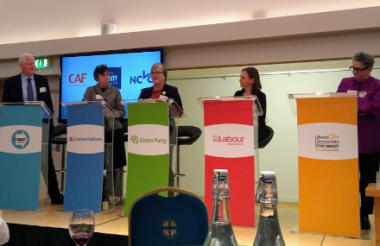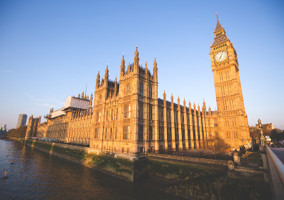Last night representatives from five political parties took part in a debate about issues affecting civil society and answered questions from charity leaders about their parties' policies.
The debate was chaired by Alan White, news editor at Buzzfeed, and was organised by the Charities Aid Foundation and NCVO.
CAF’s chief executive Sir John Low said that charities are a “cohesive” force across the UK that “outlast politicians, outlast governments and even political parties - they represent a powerful force for good”. He said that he wanted to see “rhetoric backed up by meaningful action” regardless of whichever party forms the next government.
Opening statements
Baroness Barran said the Conservatives would be increasing public spending “in a very major way”. A Tory government would continue to work on the civil society strategy, although she said it needs to “evolve”. Barran said charities should move from holding “transactional” relationships with local governments to relational ones with “human connections”.
Labour’s spokesperson, Vicky Foxcroft MP, said that charities have “held our society together” under Tory governments and “protected our communities from even further harm”. She said Labour will invest in public services, unleash dormant assets, provide free universal broadband, build a fully funded national youth service and repeal the Lobbying Act.
Baroness Barker represented the Liberal Democrats. She said that the sector has been “overlooked” and that it needed to be of part key discussions and viewed as a “force” to build resilient communities.
Caroline Russell, representing the Green Party, said that her party would deal with the climate emergency and deliver social justice through a focus on a “wellbeing” based economy.
Matthew Patten, MEP and spokesperson for the Brexit Party, said Brexit is a “major opportunity” for charities. He said the party would free up dormant funds, take the charities minister out of DCMS and into the Cabinet Office, adapt the Charity Commission so it is “a real champion for the sector”, and make changes around tax incentives for giving.
National Citizen Service
Barran said the NCS was an “important element” in encouraging volunteering. She added that the evidence suggests that if children volunteer young then they are more likely to do so in adulthood.
Russell said she did not know much about NCS apart from that her youngest child took part and got “a lot out of it”, but added that it must be a very expensive programme to run.
Meanwhile, Barker said she was “extremely critical” of the NCS and that it has “consistently failed”. She said it was too expensive and does not reach those who need it most. She added that setting it up as a royal charter body was “an act of vanity on behalf of the government at the time”.
Patten said he had “really mixed views about NCS”. It is “a great opportunity” and “pathway”, but said it concerns him that it takes up a lot of resources and that its success is with young people who need it less rather than with “hard to reach” youth.
Foxcroft said 95 per cent of funding for youth work goes to NCS. She said that she had placed a number of freedom of information requests on the way the scheme is run but had not received a response. Foxcroft called it a “disgrace” that government is not transparent on how this money has been spent. She also raised concerns about troubles with The Challenge, the charity that was until recently an NCS provider, saying “we are not getting the answers”.
International aid
Currently 0.7 per cent of gross national income goes to international aid.
Patten said that “our point of view is really straightforward - we want to halve it”. He said this was for two reasons. First, because “a significant amount” is being “used poorly”, by being used outside of DFID. Secondly, he said the UK needs to be strategically invested in.
Barker said the Liberal Democrats would be keeping the 0.7 per cent commitment as it “continues to do an immense amount of good”. Similarly, Foxcroft said Labour would maintain and “look to increase it”. She added that the sector needs to diversify, and that organisations working internationally need to be diverse. Barron said the Conservatives would also maintain the 0.7 per cent and focus on sustainable development goals and education for women and girls.
Russell said the Green Party would increase foreign aid to 1 per cent, and abolish “tied aid” because placing controls on how the money is spent is not in the interest of the recipients.
Uncertainty around Brexit
Foxcroft said Labour would guarantee that funds from the European structural investment fund were mirrored in the UK Shared Prosperity Fund. Patton said the Brexit Party would stop uncertainty by getting Brexit done “properly”, and that through funding from dormant assets the sector would be “well placed going forward”.
Liberal Democrats said the “economic damage” from Brexit would be too high a price, adding that if UK charities do not want to be left behind, they need to be part of the EU. Similarly, the Greens said a Brexit deal would be the beginning of “years of uncertainty”, and that charities are investing time in securing new sources of income because of strain around funding, instead of focusing on their mission.
Meanwhile, Barran said the Conservative manifesto commits to matching funding from the EU. She added that the trust that communities have for charities would help the sector to heal divisions, which the Conservative would give resources for.
Lobbying Act and charity campaigning
Barran said she wanted to tackle any “loss of agency” felt by charities as a result of the Lobbying Act and that there is room for reform, but added she does not “feel that people are constrained”.
Labour's Foxcroft said the party would repeal the Lobbying Act, because charities should feel “empowered” to fight on their issues so they can “speak truth to power”.
Similarly, Patten said that the Lobbying Act was “a really big mistake” and that it needs to change. But he said charities are “very effective” at making their voices heard in certain areas.
Indeed, the Liberal Democrats said the act “went too far” and that “the inclusion of charities was a mistake”. But Barker said that if charities were removed from the Act, it would be “helpful” for a code of practice to be established, so charities know how they should engage in election campaigning.
Russell said those lobbying on causes should be “heard”. She suggested that the Lobbying Act might have mobilised community organising like Extinction Rebellion. Where charities have not been able to advocate because of “suppression”, other organisations have blossomed.
How will government help small charities?
Barker said that giving small charities access to information about governance is key. She also said her criticism of the Charity Commission is that it could do better to signpost small charities to sources of information. She added that small charities should be helped with digital skills, and that they should all have Facebook pages with their annual reports and accounts on. Barron agreed that it should be made “easy” for small charities to access information.
Foxcroft said that government should support small charities by increasing grant funding and resourcing local authorities. Russell said the Greens would be lifting the administrative burden for small charities and moving to a universal basic income model.
Patten said it was “utterly, utterly impractical” for all small charities to get direct grant funding from government. He said there is such “demand” on small charities that there should be no “added complexity”, and such organisations should be asked to do less. He added that EU funding is very “complex” and that it should be made easier for small organisations to apply for funding.
Live stream
The live stream can be rewatched here.
Welcome to our #charitydebate in association with @Caf. We're joined by @dianabarran, @vickyfoxcroft, @math_patten, @lizbarkerlords and @carolinerussell. Your chair for the evening is @aljwhite https://t.co/F7bwbfC3dT
— NCVO (@NCVO) December 4, 2019
|
Related Articles












